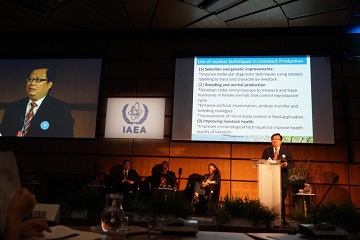THE WORLD’S RECOGNITION ON IPB ANIMAL HUSBANDRY COMMUNITY SCHOOL AS INDONESIAN PIONEER

IPB was honored this year to be part of the Indonesian delegation at the 62nd International Atomic Energy Agency (IAEA) General Conference in Vienna, Austria on September 17-21, 2018. IPB was especially invited to share their success story as Indonesian most striving pioneer. The Indonesian delegation was chaired by the Head of National Nuclear Energy Agency (BATAN) with representatives from the Nuclear Energy Supervisory Agency (BAPETEN), and IPB which was represented by the Vice Rector for Collaboration and Information Systems, Prof. Dr. Ir. Dodik Ridho Nurrochmat, M.Sc.F.Trop, the IPB Animal Husbandry Community School (SPR) Team including Prof. Dr. Ir. Muladno, MSA and Dr. Ir. Anggraini Sukmawati, MM and 2 (two) farmers, Juwanto (SPR Soko, Bojonegoro, East Java) and Wagiman (SPR Musi Banyuasin, South Sumatra).
A significant problem, the world is currently facing, is the population growth which affects Indonesia as well. Indeed, the Indonesian food production industry slows and even tends to be stagnant regarding both quality and quantity. Thus, the development of food supply strategy needs to be seriously handled by the Indonesian government. An approach proposed by Bogor Agricultural University (IPB) is the SPR which arises from the idea of empowering small-scale farmers who exploit around 98% of the Indonesian livestock. About 4 million small-scale farmers are considered as assets for the government in helping programs to provide livestock products for the Indonesian community.
In fact, in the last five years, IPB has created many SPRs in livestock production centers in Indonesia that collaborate with the local governments to farm livestock such as cattle, goat, and chicken. The SPR program is an effort to improve not only the knowledge but also the skills of Indonesian farmers through training and technological dissemination as well as the establishment of institutions for farmers the ultimate goal of which is to increase the national meat production. To date, 29 SPRs have been developed in 13 districts in Indonesia.
The Vice Rector for Collaboration and Information Systems, Prof. Dr. Ir. Dodik Ridho Nurrochmat, M.Sc.F.Trop, had the opportunity, at the Scientific Forum, to give a presentation on the use of nuclear technology for sustainable livestock production while paying close attention to the mitigation of the climate change effects. In his presentation, Prof. Dodik explained that nuclear technology could be used in the process of genetic selection and improvement, livestock breeding and production, and livestock health improvement. All the applications of nuclear technology on farms are carried out through non-destructive processes, without harming the livestock. One priority is the application of nuclear technology to improve the quality of animal feed. The use of nuclear technology can enhance the quality of animal feed through the optimization of good microbial content to increase the growth of livestock and reduce the production of methane gas which is one of the most common greenhouse gases produced by livestock. An imperfect digestion process causes its production.
The IAEA has seen that Indonesia has the potential of becoming a role model in agriculture and animal husbandry, primarily if the nuclear technology is widely implemented within the SPR and other small farmer groups. The use of appropriate nuclear technology can help Indonesian and other developing countries small-scale farmers to increase livestock production and actively participate in climate change mitigation.


